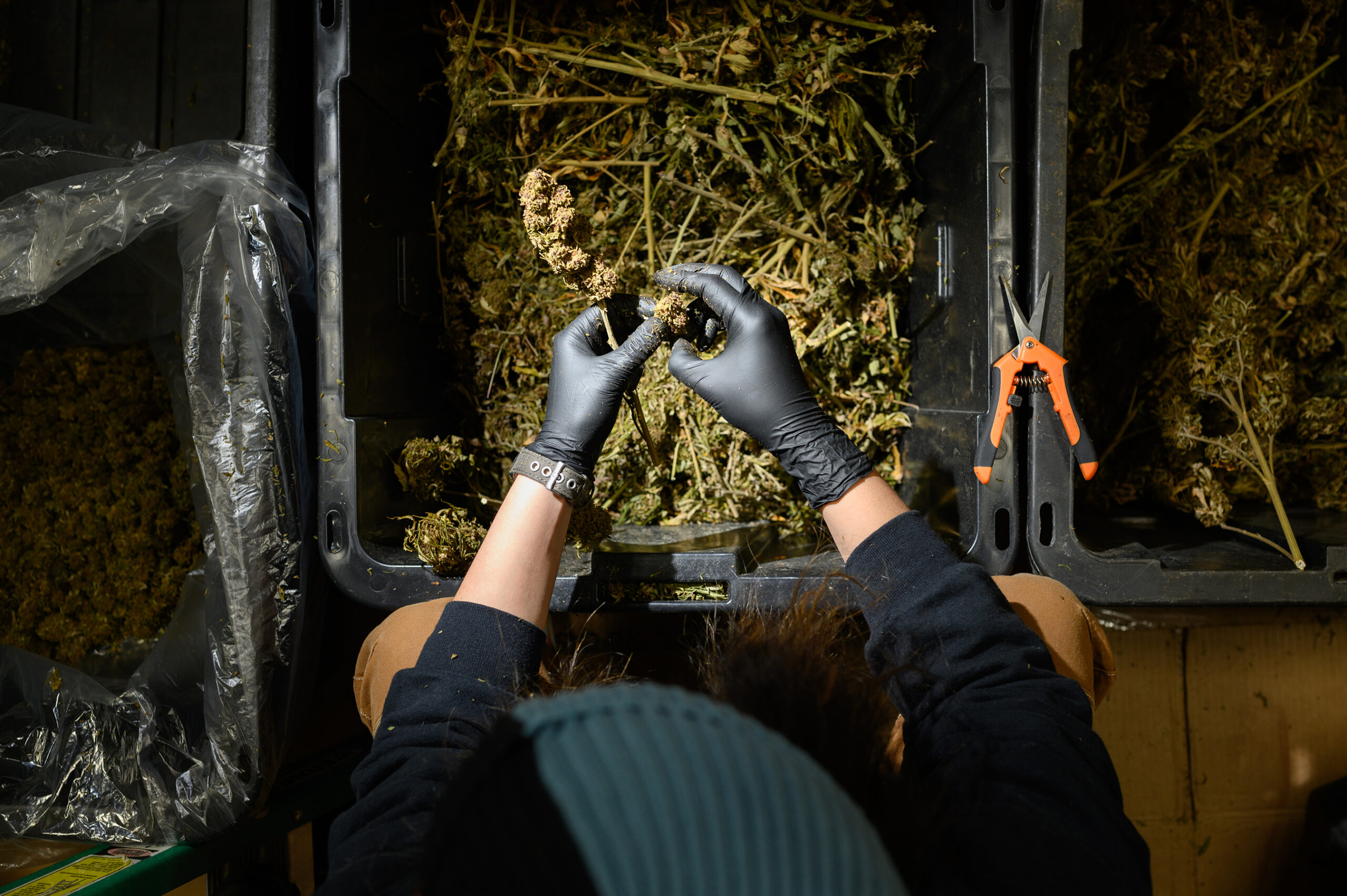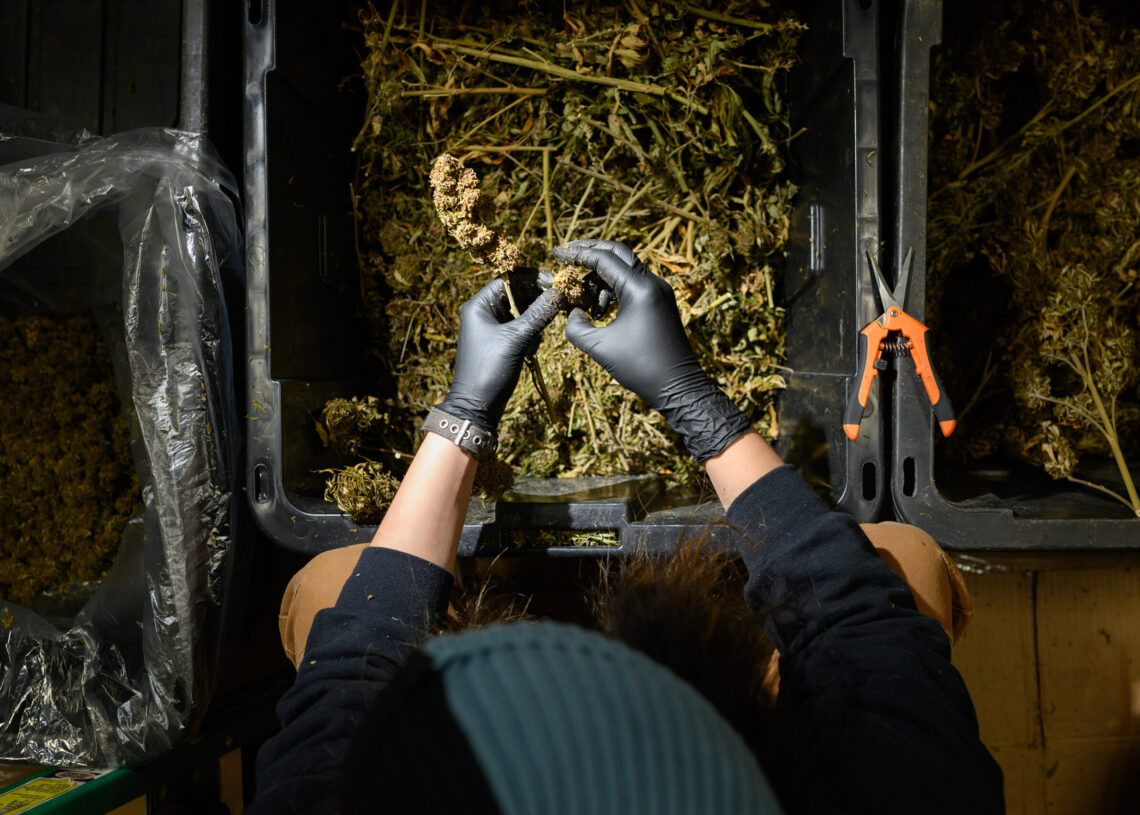
Congress on Wednesday stiffened restrictions on hemp, a form of the cannabis plant that was legalized in the 2018 farm bill, triggering protests from producers who have come to rely on the now multibillion-dollar industry as a source of income.
The new law aims to close a legal loophole that lets market players sell unregulated food and beverages containing hemp-derived psychoactive compounds. The rules set a stricter limit on the amount of tetrahydrocannabinol, or THC, the intoxicating chemical also found in marijuana, that a hemp product can contain.
Congress on Wednesday stiffened restrictions on hemp, a form of the cannabis plant that was legalized in the 2018 farm bill, triggering protests from producers who have come to rely on the now multibillion-dollar industry as a source of income.
The new law aims to close a legal loophole that lets market players sell unregulated food and beverages containing hemp-derived psychoactive compounds. The rules set a stricter limit on the amount of tetrahydrocannabinol, or THC, the intoxicating chemical also found in marijuana, that a hemp product can contain.
Hemp was once on the federal controlled substances list, but it was removed by lawmakers who, seven years ago, touted the crop’s potential to boost farmers’ income. It can be used to make products such as rope, clothing and food. Hemp was especially welcomed by Kentucky farmers, who hoped the commodity could offset losses from falling tobacco sales.
The wider hemp industry is now estimated to be worth $30 billion, according to the Cannabis Farmers Alliance, an industry group representing cannabis growers.
But lawmakers, including Republican Sen. Mitch McConnell of Kentucky, a champion of the 2018 legislation, say companies have exploited a farm bill loophole to legally formulate products with enough THC to get their consumers high.
“Unfortunately, companies … [take] legal amounts of THC from hemp and [turn] it into intoxicating substances,” McConnell said on the Senate floor Monday. These companies then market it to children in “candy-like packaging” and sell it in “easily accessible places like gas stations,” he said.
The Food and Drug Administration has previously said that it is “concerned by the proliferation of products that contain delta-8 THC and are marketed for therapeutic or medical uses, although they have not been approved by the FDA.”
Hemp contains lower levels of THC than its cousin marijuana and must contain 0.3 percent or less by dry weight of THC to be legally classified as hemp. But this creates a loophole: Producers can buy legal hemp and extract the THC to create higher concentrations that can then be added to food or beverages, making products with THC levels similar to those sold in legal marijuana stores, such as hemp drinks, which have exploded in popularity alongside vapes and gummies.
Marijuana remains a controlled substance that cannot be moved across state lines legally.
McConnell and most Republicans in the Senate approved a restriction this week that would keep the 0.3 percent limit on hemp-derived cannabinoid products for human or animal use and ban cannabinoids produced from hemp that are not naturally in the plant or are synthesized from it.
The new bill would also outlaw “any final hemp-derived cannabinoid products containing … greater than 0.4 milligrams combined total” of THC or “any other cannabinoids that have similar effects (or are marketed to have similar effects).”
The restriction was included in the 2026 government funding bill that was passed in the House and signed into law by President Donald Trump on the same day. The new restrictions on hemp take effect a year from now.
Republican Sen. Rand Paul (Kentucky) criticized the bill as a blanket ban that would suffocate the livelihoods of hemp farmers, although he acknowledged that some had exploited the loophole in the 2018 bill.
“The hemp industry, myself and others have come together and we have been willing to negotiate to get rid of the bad actors,” he said in the Senate on Tuesday. “And yet instead we are met with legislation that would be prohibition.”
“Every hemp seed in the country will have to be destroyed,” he added. “This is the most thoughtless, ignorant proposal to an industry that I’ve seen in a long, long time.”
Hemp industry advocates say the restrictions would bring down legitimate hemp growers who produce nonintoxicating hemp products, including those containing CBD, or cannabidiol, the legal cannabinoid found in hemp widely marketed as beneficial for health. The World Health Organization said in 2018 that CBD has a relatively low abuse potential and doesn’t appear “to exhibit THC-like … stimulus effects.”
“U.S. Senators were promised that this bill protects nonintoxicating CBD products, which is manifestly untrue — the large majority of nonintoxicating CBD products on the marketplace feature more than 0.4 mg of THC per container,” said Jonathan Miller, general counsel for the U.S. Hemp Roundtable, an industry lobbying group.
The U.S. Hemp Roundtable issued a statement on Monday saying that the bill “threatens to eliminate America’s $28.4 billion hemp industry and jeopardizes more than 300,000 American jobs.” The legislation could also wipe out 95 percent of the industry and cost states $1.5 billion in lost tax revenue, the group said.
Joseph Calderone, the president of the Cannabis Farmers Alliance, said in an emailed statement that the draft bill “creates an opportunity for the black market to fill the vacuum.”
The proposed bill isn’t a policy tweak that corrects an unintended market outcome, Calderone said. “It’s a seismic shock.”
The marijuana industry — often at odds with the hemp industry over competition and regulations on cannabis products — welcomed the new restrictions on hemp.
“The bill passed tonight carefully distinguishes between intoxicating and nonintoxicating products and synthetic and natural products,” said Chris Lindsey, a vice president at the American Trade Association for Cannabis and Hemp — whose membership includes cannabis companies in state-regulated marijuana markets.
Paul Murdoch, an Oregonian hemp farmer, said the bill would kill off his farm, which produces nonintoxicating CBD products.
“Unregulated intoxicants are not a long-term strategy and legislators took notice. … Thus began legislation to regulate the CBD industry out of existence,” he wrote in an email.
“CBD has been a lifesaver for me and for many others. After a serious injury, I found CBD as a pain mitigant to replace opioids. Many others rely on it for a variety of issues, none involving any intoxication,” he continued. “And that may go away.”
David Ovalle contributed to this report.
The post Congress tightens THC restrictions on hemp, closing farm bill loophole
appeared first on Washington Post.




